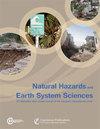Semi-automatic mapping of shallow landslides using free Sentinel-2 images and Google Earth Engine
IF 4.7
2区 地球科学
Q1 GEOSCIENCES, MULTIDISCIPLINARY
引用次数: 1
Abstract
Abstract. The global availability of Sentinel-2 data and the widespread coverage of cost-free and high-resolution images nowadays give opportunities to map, at a low cost, shallow landslides triggered by extreme events (e.g. rainfall, earthquakes). Rapid and low-cost shallow landslide mapping could improve damage estimations, susceptibility models and land management. This work presents a two-phase procedure to detect and map shallow landslides. The first is a semi-automatic methodology allowing for mapping potential shallow landslides (PLs) using Sentinel-2 images. The PL aims to detect the most affected areas and to focus on them an high-resolution mapping and further investigations. We create a GIS-based and user-friendly methodology to extract PL based on pre- and post-event normalised difference vegetation index (NDVI) variation and geomorphological filtering. In the second phase, the semi-automatic inventory was compared with a benchmark landslide inventory drawn on high-resolution images. We also used Google Earth Engine scripts to extract the NDVI time series and to make a multi-temporal analysis. We apply this procedure to two study areas in NW Italy, hit in 2016 and 2019 by extreme rainfall events. The results show that the semi-automatic mapping based on Sentinel-2 allows for detecting the majority of shallow landslides larger than satellite ground pixel (100 m2). PL density and distribution match well with the benchmark. However, the false positives (30 % to 50 % of cases) are challenging to filter, especially when they correspond to riverbank erosions or cultivated land.使用免费的Sentinel-2图像和谷歌地球引擎绘制浅层滑坡的半自动地图
摘要Sentinel-2数据的全球可用性以及免费和高分辨率图像的广泛覆盖,为以低成本绘制极端事件(如降雨、地震)引发的浅层滑坡提供了机会。快速和低成本的浅层滑坡测绘可以改进损害估计、易感性模型和土地管理。这项工作提出了一个两阶段的程序来检测和绘制浅层滑坡。第一种是半自动方法,允许使用Sentinel-2图像绘制潜在的浅层滑坡(PL)。PL旨在检测受影响最严重的地区,并通过高分辨率地图绘制和进一步调查将重点放在这些地区。我们创建了一种基于GIS且用户友好的方法来提取基于事件前后归一化差异植被指数(NDVI)变化和地貌过滤的PL。在第二阶段,将半自动清查与高分辨率图像上绘制的基准滑坡清查进行了比较。我们还使用谷歌地球引擎脚本提取NDVI时间序列并进行多时相分析。我们将这一程序应用于意大利西北部的两个研究地区,这两个地区在2016年和2019年遭受了极端降雨事件的袭击。结果表明,基于Sentinel-2的半自动测绘可以探测到大多数大于卫星地面像素(100 m2)。PL密度和分布与基准匹配良好。然而,假阳性(30 % 至50 % 案例)很难过滤,尤其是当它们对应于河岸侵蚀或耕地时。
本文章由计算机程序翻译,如有差异,请以英文原文为准。
求助全文
约1分钟内获得全文
求助全文
来源期刊
CiteScore
7.60
自引率
6.50%
发文量
192
审稿时长
3.8 months
期刊介绍:
Natural Hazards and Earth System Sciences (NHESS) is an interdisciplinary and international journal dedicated to the public discussion and open-access publication of high-quality studies and original research on natural hazards and their consequences. Embracing a holistic Earth system science approach, NHESS serves a wide and diverse community of research scientists, practitioners, and decision makers concerned with detection of natural hazards, monitoring and modelling, vulnerability and risk assessment, and the design and implementation of mitigation and adaptation strategies, including economical, societal, and educational aspects.

 求助内容:
求助内容: 应助结果提醒方式:
应助结果提醒方式:


